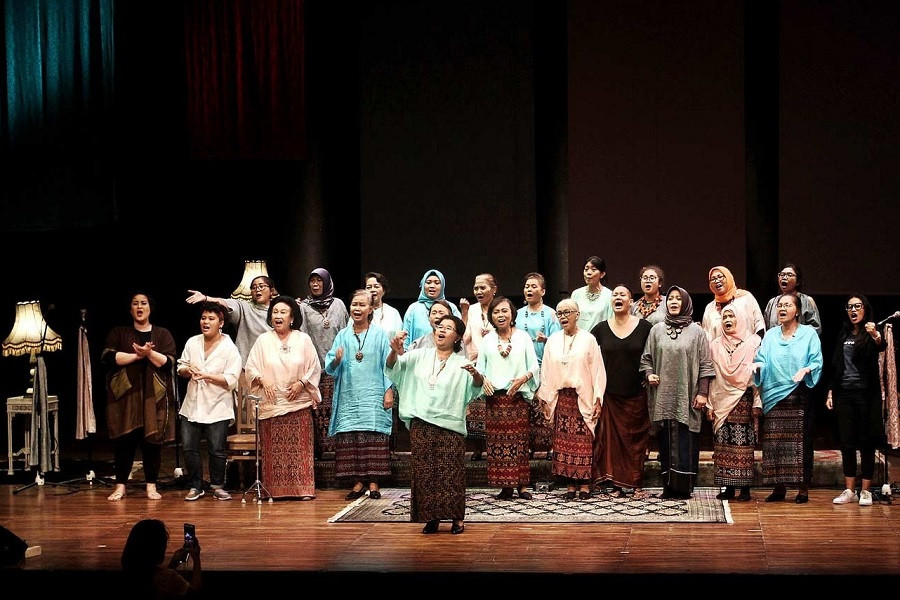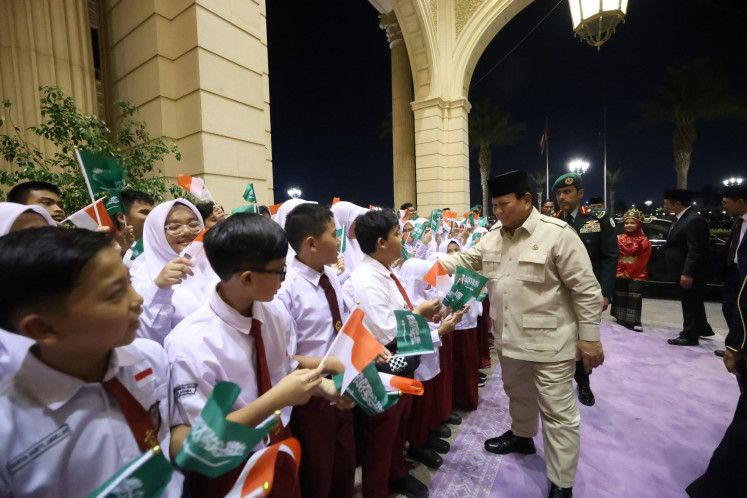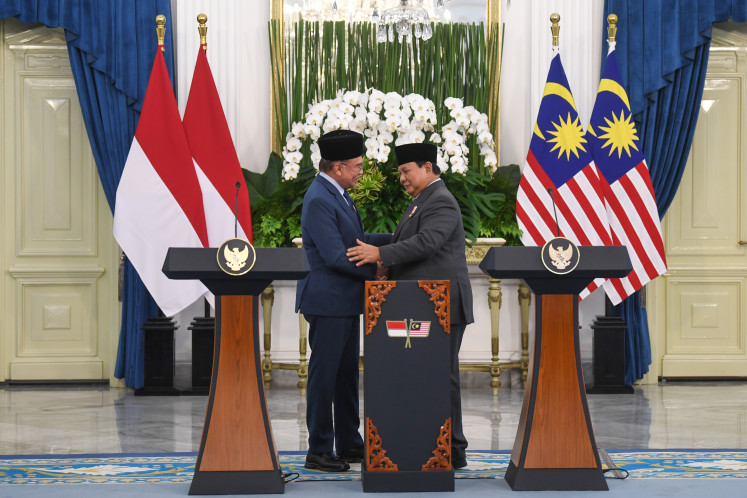Popular Reads
Top Results
Can't find what you're looking for?
View all search resultsPopular Reads
Top Results
Can't find what you're looking for?
View all search resultsDialita Choir and the struggle to fight the nation’s amnesia
Through songs and music, these women recount their gripping life journey while in prison without trial and a heartbreaking life full of wounds and trauma for decades afterward.
Change text size
Gift Premium Articles
to Anyone

I
n 1965, millions of people accused of being communists were arrested, killed or exiled. To survive, some of those who were exiled sang and wrote songs while in prison. The songs are about mothers, children, hope and love stories.
More than 50 years later, a group of 1965 tragedy survivors founded the Dialita Choir, which deliberately chooses to sing songs they composed in prison and songs that had been banned during the New Order era, in the hope of telling the younger generation about Indonesia's dark, unfinished history.
I got to know the all-female Dialita Choir in 2016 when its first album Dunia Milik Kita (The world belongs to us) was released. As a millennial, I am amazed at the vital elan of the mother singers who survived the 1965 tragedy, Dialita is an Indonesian acronym for “over 50 years”. Even though they are in their old age, they are passionate about retelling the dark past through the interweaving of tones and rhythms.
Time flies. Dialita Choir and the album Dunia Milik Kita have recently returned to being heavily rotated in my music playlist after I watched a documentary movie titled Lagu Untuk Anakku (Song for My Children) by director Salahuddin Siregar.
Lagu Untuk Anakku is also the title of a song sung by the Dialita Choir, the main focus of this film, which can be watched for free on YouTube.
Through songs and music, these women recount their gripping life journey while in prison without trial and a heartbreaking life full of wounds and trauma for decades afterward.
“From behind bars my heart is tested, am I real gold, or an imitation?", so goes the opening line of the movie, which is taken from the song “Ujian” (Life Test), the opener of the album Dunia Milik Kita.
Accompanied by the tinkling of the piano played by Leilani Hermiasih alias Frau, Dialita emphasized that their imprisonment without trial was a life test that they had to go through. However, instead of lamenting the injustice, they remained enthusiastic and believed that, “A high wall separates us. But sure and certain. The future will come. We will definitely be back.”
The Dialita Choir and the songs its members composed from behind prison walls should knock on our awareness, especially the younger generation, about a humanitarian tragedy that not only claimed hundreds of thousands of lives but also robbed the future of millions of others, including members of the Dialita Choir.
In the film Lagu Untuk Anakku, the director beautifully describes how these 1965 survivors follow a creative process of reviving the songs they composed in detention. They have to dig up the lyric files and notes of the songs; young musicians help them arrange the songs, and members of Dialita, with all the limitations due to their old age, enthusiastically perform those songs in public for the younger generation.
Art, or music in the context of Dialita, is the most effective medium to convey a message, especially to the younger generation. That is why by listening to Dialita's music, we will be able to better understand how the 1965 tragedy shattered the lives and hopes of many.
Their songs have no political connection at all. The lyrics of the songs “Efek Rumah Kaca” (Greenhouse Gas Effect) or “Homicide”, for example, talk about the spirit of life, hope and love. In my opinion, this is precisely the strength of Dialita Choir: That "political" and "personal" aspects cannot be separated and the political upheaval of 1965 was closely related to the personal realm of many victims at that time.
Dialita's songs convey hope. One of them describes how they survived detention in the Plantungan internment camp by eating whatever they found -- wild plants, snakes, lizards – because they had great hope of finding freedom and reuniting with their loved ones someday.
In the song “Salam Harapan” (Greeting of hope) Dialita expresses the belief in the power of hope: “Sail fast. Our boat sails fast. It will definitely reach the beach of dreams.”
In his book Kekerasan Budaya Pasca 1965 (Cultural Violence Post 1965) the late Wijaya Herlambang said the 1965 tragedy only showed that physical violence can be justified as long as there is cultural violence that follows it.
He adopts Johan Galtung's theory of "structural violence", which maintains that violence is a unit consisting of direct (physical) violence, structural violence and cultural violence. Herlambang used Galtung's model of thinking to explain why thousands of people had to be killed in 1965-1966, and why until now it seems most Indonesian people justify the mass killings and try to deny the dark episode of their history.
During the Soeharto era, the songs of Dialita could not be heard. Their music was silenced by the cultural violence imposed by the New Order. This also happened to “Genjer-Genjer”, a song composed by Muhammad Arief which actually tells the fate of the poor during the Japanese occupation but was banned because it was considered a communist song.
After Reform in 1998, the songs could be played again.
Despite the regime change, Dialita's music may not be able to eradicate the stigma and eliminate the culture impunity. However, was not Dialita's original goal to target the younger generation? So, by listening to Dialita songs, we should be more historically literate and become more aware of our history.
As founding president Sukarno once stated: “Never forget history”. We should never forget the 1965 humanitarian tragedy.
***
The writer is an ethnomusicologist and musician, founder and editor in chief of Serunai.co









